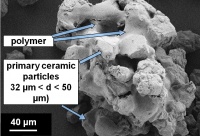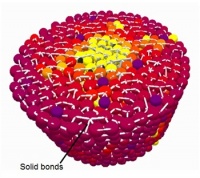Michael Szelwis: "Particle-reinforced composites simulated by cohesive discrete elements"
Содержание
Project Overview
For the research on a ceramic-polymer-composite (TiO2 in a PMMA matrix) with very high content of ceramic particles a numerical model is being investigated. To simulate the nonlinear deformation due to indentation a discrete element approach has been chosen with each ceramic particle being represented by one particle in the simulation. Several models for the interaction of the ceramic particles with one another as well as with the polymeric matrix, such as cohesion and physical bonds, are being tested using the software package EDEM and are also being compared with experimental results.
Previous Work
<nowiki>Simulating the mechanical behaviour of the investigated material, Hertzian contacts between the particles were combined with EDEM's default bond model representing the polimeric matrix. First tests revealed qualitative accordance to experimental results within the region of elastic deformation of the specimen. It was shown that a stiffer material used for the polymeric matrix, which has been modelled by bonds with a larger Young's modulus, leads to a higher stiffness of the specimen.
Results
Outlook
- Comparison of the results with experimental data
- Examining the suitability using the model for investigation of hirarchic materials

